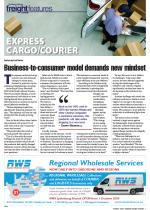The express courier and cargo industry has seen dramatic changes in recent years, boosted in particular by the widespread digitalisation of society. According to Garry Marshall, CEO of the South African Express Parcel Association (Saepa), as more companies and individuals are now buying directly from producers, there has been an increase in express parcel deliveries worldwide. “Online shopping trends have significantly impacted demand,” he says. “The outbreak of Covid-19 only accelerated this already growing trend.”
Even in South Africa where before the pandemic only around 1% of sales were online, the e-commerce sector has boomed.“We predict that this trend of upward growth will continue.”
This is in line with the recent findings of a study by advisory consultancy Deloitte which found the pandemic had rapidly changed behaviour towards online channels and that the shifts were likely to stick post-pandemic. Much as the SARS crisis in 2003 kick-started Alibaba and other Chinese companies’ e-commerce successes, this pandemic will take online shopping to a new level.“For our industry, this is good news,” says Marshall. “The trend line is showing new buying patterns around the world. The express industry has the best ability to handle many of these new once-off consumer-based shipments. It is by far the most natural vehicle to fulfil that last mile.”
Locally, volumes are already on the increase. “In the past, the movement of this express cargo was predominantly business-to-business. The pattern is changing quickly, and it is now also business-to-consumer focused. It will require the express sector to think out of the box as it cannot be business as usual. The business-to-consumer model is a low margin business that requires super efficiency to be cost-effective.”
According to the Deloitte study, companies that invest courageously and timeously in pivoting their businesses toward the behavioural changes can and will capture market share, emerging as market leaders post-pandemic. Marshall agrees, saying it requires a new mindset. “This change we are seeing allows us as an industry to take a new direction, creating new impetus and coming up with innovative solutions in how we operate,” he explains. “Taking a parcel from point A to point B has been around for donkey’s years, but the technology and the innovation we are seeing is phenomenal and turning our industry on its head.”
He says the sector is not without its challenges. “Like many other sectors, we were affected negatively during the initial stages of the lockdown and volumes dropped significantly, but they have been on the increase as the lockdown has ea sed.”Another challenge with which the industry continues to battle is crime. “Again, it is not just in the express market where safety and security is a concern, but the transport sector as a whole. We continue to work with the authorities in addressing high crime levels.” The sector is also currently involved in legal action against the Independent Communications Authority of South Africa (Icasa) after the regulator took action against Saepa members for allegedly violating regulations. “There are challenges in our industry, but that is not unique. Our overall outlook is incredibly positive,” says Marshall. “The last mile is growing as is the business-to-consumer model, which all translates to higher volumes.”
INSERT: "Much as Sars crisis in 2003 kick started Alibaba and other Chinese companies' e-commerce successes, this pandemic will take online shopping to a new level." - Garry Marshall

